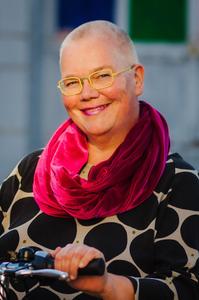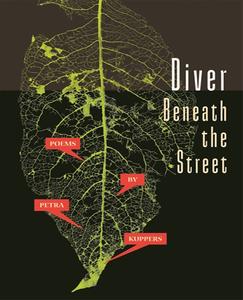
|
|
| photo: Tamara Wade | |
Petra Kuppers is a disability culture activist and a community performance artist who uses somatics, performance, and speculative writing to engage audiences toward more socially just and enjoyable futures. She is the Anita Gonzalez Collegiate Professor of Performance Studies and Disability Culture at the University of Michigan, a 2023 Guggenheim Fellow, and codirector of the somatic writing studio Turtle Disco. Diver Beneath the Street (Wayne State University Press, February 13, 2024) is a collection of dynamic and somatic poems that traverse the realms of urban space, wild rivers, and the hinterlands of suburbia, glimpsing the decay of bodies, houses, carpets, hair, and bones by way of ecopoetry.
Handsell readers your book in 25 words or less:
What happens when your neighborhood is the focus of true-crime drama? How do lands, murder, disability, and poetry work together? Dive with me.
On your nightstand now:
C Pam Zhang's Land of Milk and Honey, a dystopian climate fiction novel that depicts its protagonist as a chef on a Decameron-like mountaintop setting as the world starves. This is so luscious, so decadent--and you will find out what thawed mammoth flesh tastes like.
Sara Tantlinger's The Devil's Dreamland offers poetry as crime documentary, about Chicago serial killer H.H. Holmes. I believe poetry is an excellent medium to talk about the gaps and incomprehensibilities of true crime. And Marjorie Liu's and Sana Takeda's The Night Eaters, a gorgeous horror graphic novel of twisty mothers and haunted houses.
Favorite book when you were a child:
Mary Shelley's Frankenstein. I never forget the moment of awakening, when "the dull yellow eye of the creature opened." I began at that moment to understand how an author can manipulate intensities through the senses.
Your top five authors:
Adrienne Rich, for feminist diving into wrecks. Rainer Maria Rilke, for poetry about longing and touches-beyond-this-world. Victor LaValle and China Miéville, for what they do in their different ways to horror/fantasy genre writing. Gerald Vizenor, for Indigenous horror and disabled cannibal moth creatures.
Book you've faked reading:
The Bible.
 Book you're an evangelist for:
Book you're an evangelist for:
Alexis Pauline Gumbs's M Archive: many people know her gorgeous creative nonfiction book Undrowned better, but the prose poetry collection M Archive is a rich exploration of the elements, and of Black artistry lovingly and bodily engaged with dirt, sky, ocean, and fire in a post-apocalyptic world of new and old relations. It's a book full of insights and offerings for living more consciously, for creating healing spaces in a changing world. I witnessed Gumbs give a reading from the book as a divination practice, asking members of the audience to hold a question and then offer a page number for her to read out--and then Gumbs and the audience parsed together what appeared on that page, going deep. What a way to touch with literature.
Book you've bought for the cover:
Cynthia Pelayo's Crime Scene. I actually bought this poetry collection because it is a deep exploration of the detective position in police procedurals, of the price humans pay in the hunt for a murderer--but it also has the most gorgeous cover: a skeleton in a dress in a field of black, with golden leaves shooting outwards--grave earth and living trees.
Book you hid from your parents:
Stephen King's 'Salem's Lot. I read it multiple times, scared myself silly with vampires and basement graves, and just loved it. I re-read it again quite recently, and the small-town horror holds up well.
Book that changed your life:
Edgar Allan Poe's short stories, crossed in my mind with Arthur Conan Doyle's Sherlock Holmes stories. Somewhere in between these detectives and their environments, between repression and unexpected eruptions of tenderness and horror, my literary desires were born.
Favorite line from a book:
So many! Here is one: "Light is the left hand of darkness and darkness the right hand of light. Two are one, life and death, lying together like lovers in kemmer." Ursula K. Le Guin, The Left Hand of Darkness. Aren't you dying to know what kemmer is?
And here is another, a brief glimpse of the Wide Open, a recurrent space in my poetry books, too--from Albert Camus's The Plague: "You think about bathing in the sea--thick as velvet, supple and smooth as a wild animal."
Five books you'll never part with:
Susan Nussbaum's Good Kings Bad Kings, a novel about disability culture and its joys and tears. Disabled youth in a nursing home explore what it means to have rich lives, even as the insurance companies kill them slowly.
Tender Buttons by Gertrude Stein. This influential poetry collection taught many burgeoning feminists how to pay attention to the materials that surround us, how to use description as a veil, as a glass, as something that both obscures and reveals. I bought a new copy for my (now) wife, poet Stephanie Heit, when we were dating, and annotated it for her. Writing in/with poems, de/constructing books: I love these interactions.
Gabrielle Civil's The Déjà Vu, a performance art writing project, a creative nonfiction book that takes us through the art/life of a Black feminist maker. The book begins in Ypsilanti, at the Déjà Vu, which is not (not) a nightclub in Ypsilanti--and that's my hometown, and the site of my own poetry collection.
Octavia's Brood: Science Fiction Stories for Social Justice, edited by Adrienne Maree Brown and Walidah Imarisha, is a collection of stories by activists from different social justice movements, offering models for how to use creative writing as an activist tool. It's a really useful book for teaching, and I have used it in university classes like Queer/Trans Eco-Arts and Disability Culture Speculations.
Maggie Nelson's Jane: A Murder, a poetry collection about the murder of her aunt, which taught me so much about writing at the site of true crime, how to engage character, relationships, and memory in the aftermath of violent death.
Book you most want to read again for the first time:
Truman Capote's In Cold Blood, one of the initial entries in the true-crime genre.

